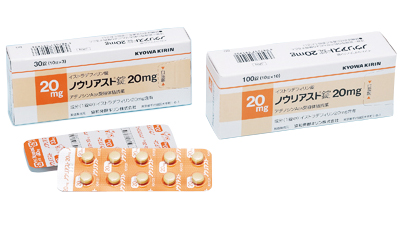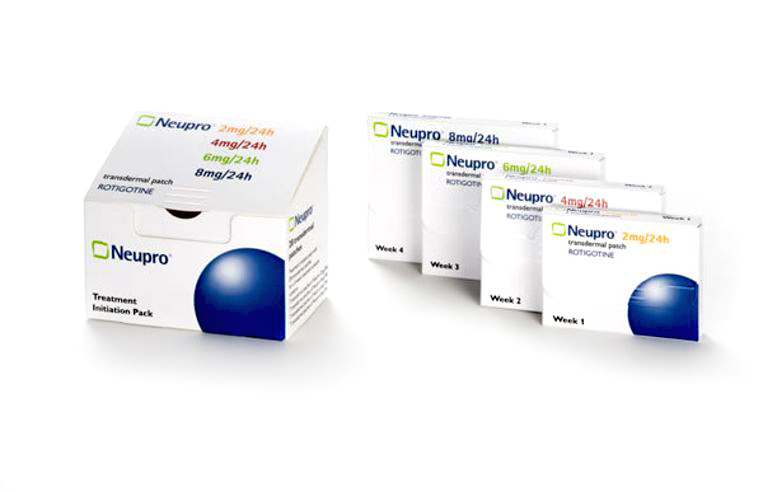Nourianz/Nouriast (istradefylline) vs Neupro (rotigotine)
Nourianz/Nouriast (istradefylline) vs Neupro (rotigotine)
Nourianz (istradefylline) and Neupro (rotigotine) are both used as adjunctive treatments for Parkinson's disease but work through different mechanisms. Nourianz is a selective adenosine A2A receptor antagonist that enhances dopaminergic neurotransmission, while Neupro is a dopamine agonist that directly stimulates dopamine receptors through a transdermal patch. When deciding between the two, a patient should consider factors such as the specific symptoms being targeted, potential side effects, method of administration, and how the drug's action might complement their existing therapy regimen.
Difference between Nourianz/Nouriast and Neupro
| Metric | Nourianz/Nouriast (istradefylline) | Neupro (rotigotine) |
|---|---|---|
| Generic name | Istradefylline | Rotigotine |
| Indications | Used as an add-on treatment to carbidopa/levodopa in adults with Parkinson’s disease experiencing "off" episodes | Used to treat symptoms of Parkinson’s disease or moderate-to-severe primary Restless Legs Syndrome (RLS) |
| Mechanism of action | Adenosine A2A receptor antagonist | Dopamine agonist |
| Brand names | Nourianz in the US, Nouriast in Japan | Neupro |
| Administrative route | Oral | Transdermal patch |
| Side effects | Dyskinesia, dizziness, constipation, nausea, hallucination, and insomnia | Nausea, vomiting, somnolence, application site reactions, dizziness, and headache |
| Contraindications | Hypersensitivity to istradefylline or any component of the formulation | Hypersensitivity to rotigotine or any component of the product |
| Drug class | Non-dopaminergic antiparkinson agent | Dopamine agonist |
| Manufacturer | Kyowa Kirin | UCB Pharma |
Efficacy
Efficacy of Nourianz/Nouriast (Istradefylline) in Parkinson's Disease
Istradefylline, known by the brand names Nourianz in the United States and Nouriast in Japan, is an adenosine A2A receptor antagonist approved for use as an adjunctive treatment to levodopa/carbidopa in adults with Parkinson's disease (PD) experiencing "off" episodes. Clinical trials have demonstrated that istradefylline can reduce the amount of time patients experience these "off" episodes, which are characterized by a re-emergence of Parkinson's symptoms. The efficacy of istradefylline was established in a clinical program including four 12-week, randomized, placebo-controlled clinical trials. In these trials, patients treated with istradefylline experienced an improvement in motor function and a decrease in "off" time, indicating its effectiveness as an adjunct therapy in PD.
However, it is important to note that the response to istradefylline can vary among patients, and the medication does not replace the need for levodopa/carbidopa. Instead, it provides an additional option to manage the fluctuations in motor control that are common as Parkinson's disease progresses. The most common adverse reactions reported with istradefylline include dyskinesia, dizziness, constipation, nausea, hallucination, and insomnia.
Efficacy of Neupro (Rotigotine) in Parkinson's Disease
Rotigotine, marketed under the brand name Neupro, is a non-ergolinic dopamine agonist available as a transdermal patch and is indicated for the treatment of Parkinson's disease. It is used both in the early stages of the disease as monotherapy and as an adjunct to levodopa in the more advanced stages. The continuous delivery of rotigotine through the transdermal system is designed to maintain stable plasma levels of the drug over 24 hours, which can help manage the motor and non-motor symptoms of PD.
Clinical studies have shown that rotigotine can significantly improve Unified Parkinson's Disease Rating Scale (UPDRS) scores, which measure the severity of Parkinson's symptoms, compared to placebo. The efficacy of rotigotine has been observed in both early-stage patients and those with advanced PD experiencing motor fluctuations. Patients using rotigotine have reported improvements in both "off" time and "on" time without troublesome dyskinesia. Common side effects of rotigotine include application site reactions, nausea, vomiting, somnolence, and dizziness. It is essential for patients to be monitored for impulse control disorders, which can be a class effect of dopamine agonists.
Regulatory Agency Approvals
Nourianz/Nouriast
-
Food and Drug Administration (FDA), USA

-
Pharmaceuticals and Medical Devices Agency (PMDA), Japan

Neupro
-
European Medical Agency (EMA), European Union

-
Food and Drug Administration (FDA), USA

-
Pharmaceuticals and Medical Devices Agency (PMDA), Japan

-
Therapeutic Goods Administration (TGA), Australia

-
NMPA (China)

Access Nourianz/Nouriast or Neupro today
If Nourianz/Nouriast or Neupro are not approved or available in your country (e.g. due to supply issues), you can access them via Everyone.org.
How it works

Make an enquiry
Choose the medicine you want to buy, answer a couple of questions, and upload your prescription to speed things up. We’ll get back to you within 24 hours.


Make an enquiry
Choose the medicine you want to buy, answer a couple of questions, and upload your prescription to speed things up. We’ll get back to you within 24 hours.


Breeze through the paperwork
We'll guide you through the required documents for importing unapproved medicine, ensuring you have all the necessary information.


Get a personalized quote
We’ll prepare a quote for you, including medicine costs and any shipping, administrative, or import fees that may apply.


Receive your medicine
Accept the quote and we’ll handle the rest - sourcing and safely delivering your medicine.

Some text on this page has been automatically generated. Speak to your physician before you start a new treatment or medication.
Let's talk
If you have any questions, call us or send us a message through WhatsApp or email:
Contact us




